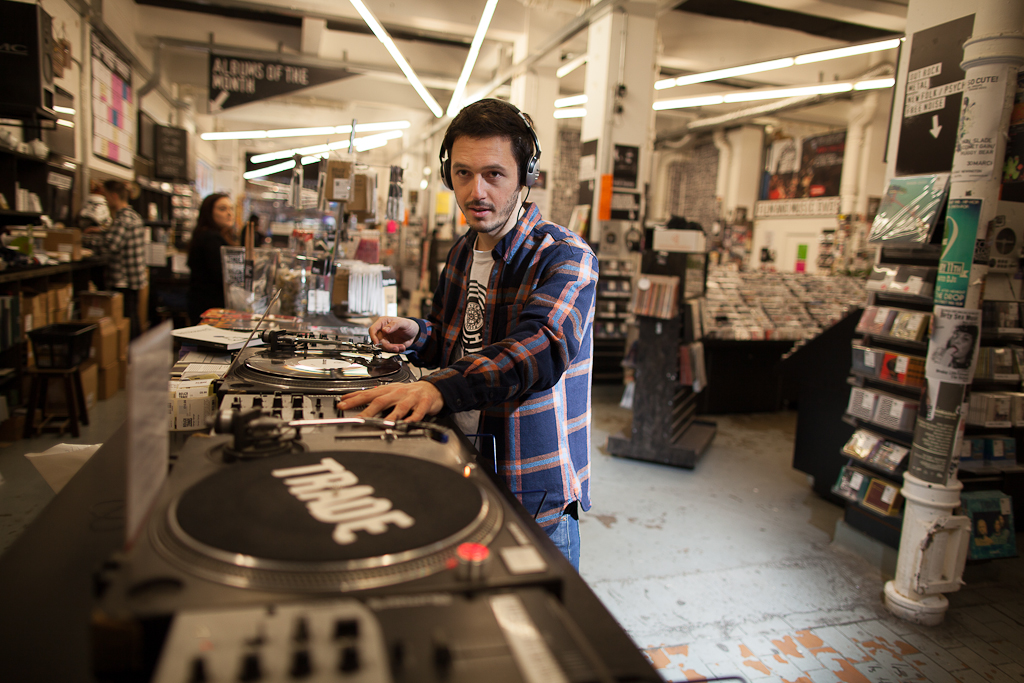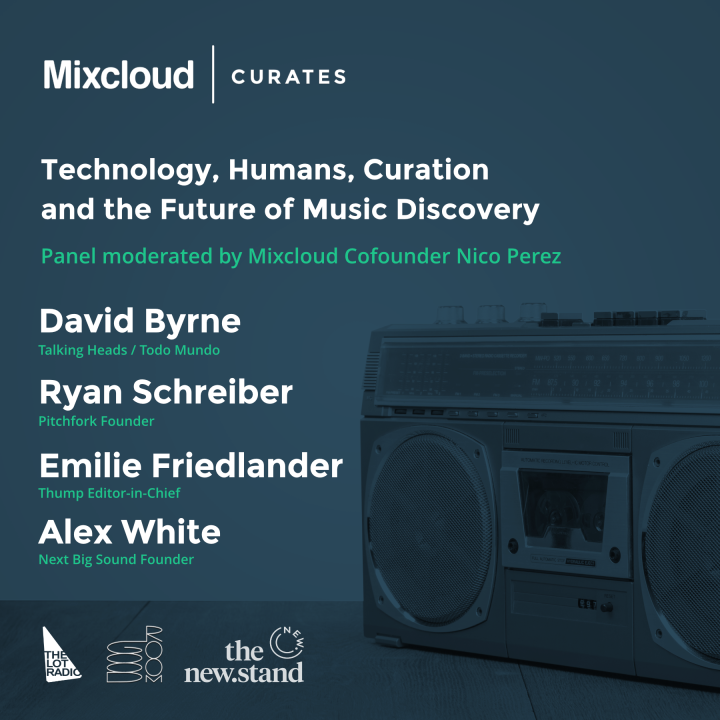Online streaming services have changed the way we listen to music. Websites like Mixcloud, Spotify, Soundcloud and Pandora have all brought new music to our attention, whether that was the goal or not. Musicians, DJs and artists now have a global platform, reaching a wider audience than most radio shows can.
Good Room has teamed up with Mixcloud and The New Stand to talk about what this means for music lovers in the future. Through their Mixcloud Curates series founder Nico Perez will be in conversation with Talking Heads frontman David Byrne, Next Big Sound Founder Alex White, Pitchfork founder Ryan Schreiber and Thump editor-in-chief Emilie Friedlander discussing “Technology, Humans, Curation and the Future of Music Discovery.”
Happening at Good Room on July 28 (you can RSVP here) the talk will explore some of the changes and challenges that technology has created for music discovery and curation. Panelists will share their views on how the near-infinite library of music has changed our perceptions of value in both the music itself, and its curation. We asked Nico to share some of his thoughts about the topic and the history of Mixcloud ahead of the event.
How did the idea for Mixcloud first come about? What was your initial goal when you started Mixcloud?
Over ten years ago, myself and one of the other co-founders had a college radio show at Cambridge University in the UK. At that time, we played to a maximum of 14 or 15 people, but I think that’s where our love for radio and the power of curation first came from. When we graduated college, we were still DJing out a lot, playing parties, recording mixtapes and things like that. We were looking for somewhere to host these radio shows and mixtapes and everything. At that time — in the mid to late 2000s — your choices were basically YouSendIt, MegaUpload, and other file sharing sites. That was kind of the original genesis behind Mixcloud, to build a platform for radio presenters and DJs to post their shows online, so people could listen to them again after they’d been broadcasted.
How has websites like Mixcloud changed how people find music? How have you seen the online streaming landscape change since you launched Mixcloud in 2008?
The core idea behind Mixcloud is that humans are incredibly good at discovering new music, filtering it and curating it. We, as a platform, need to do our best job of connecting you with the right curator at the right time too.
Since we first started the landscape has changed dramatically. Myspace is pretty much forgotten, Rdio has shutdown, Spotify has grown to be a huge player, and Youtube remains a big (although controversial) player as well.
One of the main themes for this panel talk is future of music discovery which includes industry leaders from music websites like Thump, Pitchfork and Next Big Sound. What weight do websites like these have in shaping the future of music?
I believe publications like Pitchfork and Thump have a strong role is curating and shaping the future of music. They are essentially tastemakers, and although they don’t decide which direction music will go, they can, and do, shine the spotlight on certain scenes. We’ll be exploring some of the implications of this on the panel.
One panelist for the event include the legendary David Byrne, why did you want to get him on board?
David hosts a monthly radio show on Mixcloud, and obviously he’s an incredibly accomplished artist. As such, he’s in a great (and relatively unique) position to share his thoughts from both perspectives. On a personal level, I’m a huge Talking Heads fan as well!
What other topics are you looking forward to the panel delving into on Thursday?
We’ll be exploring a few other questions such as:
- How has the growth of the Internet over the past 20 years affected you in both a personal capacity and in a professional capacity?
- As the tools of music creation multiply, and the distribution channels expand – how can human curation and technology help us navigate this growing library of content? Is there such a thing as too much music, and could we reach a saturation point?
- There are probably some aspiring artists in the audience, how do you think they can best cut through the noise?
- What do you currently enjoy most about curating, and what excites you about the coming 5 years in this space?
Many people question the sound quality of online music. How is the industry working to make this better?
As technology evolves it has always progressively increased sound quality. At the same time, I am skeptical of how many people outside of the passionate music fan community actually care about this issue. Services such as TIDAL have promoted it, but it’s unclear if many people consider it a key feature.
At home how do you prefer to listen to music – vinyl, online streaming, CD or cassette?
I had over 100 cassette tapes back in the day, and even more vinyl, but today is nearly 100% digital.
The Lot Radio is a local radio station who uses Mixcloud exclusively. Could you explain the main differences or advantages of using Mixcloud over Soundcloud as a radio host, DJ or music producer.
Mixcloud focuses exclusively on long-form audio: radio shows, DJs mixes and Podcasts. We offer unlimited free hosting space for curators, and we take care of paying royalties to artists, labels and publishers (via SoundExchange, ASCAP, BMI and SESAC).
How are the weekly Mixcloud Chart positions determined?
I can’t reveal the exact formula, but it’s a combination of popularity and how engaged listeners are.
How many waking hours a day do you spend listening to music?
Probably 75% of the time I’m listening to something!
Who are your top three Mixcloud users?
Three of my favorites that recently come to mind are J Rocc (of the Beat Junkies), Music is My Sanctuary, and Beats in Space.
Mixcloud started in the UK, how have you seen it grow across US and it’s rise here in Brooklyn? Where do you see Mixcloud going in the future?
The US is now our largest country in terms of listeners! I’m now based in NYC, and we’ve got a lot more plans in the works for reaching out across the US coming soon, so STAY TUNED.







